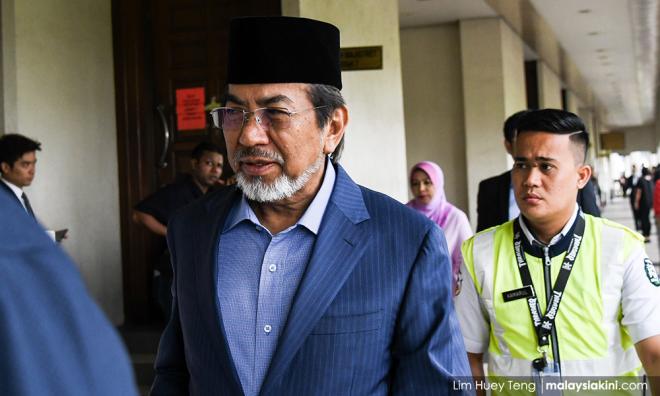
Attorney-General (AG) Idrus Harun revealed yesterday that an affidavit by the former AG Abdul Gani Patail aided former Sabah chief minister Musa Aman’s acquittal from graft charges.
In a three-page media release, Idrus said Gani has affirmed an affidavit supporting the application by Musa to quash all the charges against him. The former AG defended the decision made in 2012 to take no further action against Musa as the investigation revealed the monies involved were political funding.
The former AG also affirmed in the affidavit that “the decision was made collectively, by high-level individuals being Abdul Majid Hamzah (former head of prosecution division), Abu Kassim Mohamad (former MACC chief commissioner) and Mustafar Ali (former MACC director of investigation division).”
But wait.
The MACC had a strong case against Musa in 2012 but “for the strangest reason, the case had been ordered to be closed,” the special prosecutor Gopal Sri Ram had told the Kuala Lumpur Sessions Court.
The former Federal Court judge was opening the case on Nov 4, 2018 against Musa, who claimed trial to 35 counts of graft over getting kickbacks of more than US$63 million (RM263 million) in awarding timber concessions between 2004 and 2008.
According to Sri Ram, the MACC had been investigating the former Sabah chief minister for some time. Speaking to Malaysiakini later, he said he found it “amazing that Abdul Gani Patail, the attorney-general at the time, did not order for Musa to be prosecuted.”
He then credited Gani’s successor, Tommy Thomas for the decision to prosecute Musa.
The team then at the MACC, comprising chief commissioner Mohd Sukri Abdull, his deputy chief commissioner Azam Baki and deputy public prosecutor Ahmad Akram Gharib and Kamal Bahrin Omar was also credited.
Following the decision to prosecute, the MACC released a statement that it had indeed conducted its investigations into Musa, after which the investigation paper was submitted to the Attorney-General’s Chambers (AGC) in July 2012 for further action.
However, Gani decided not to pursue any charges as the investigation was related to political donation. At that particular time, it was the policy of the AGC to not prosecute cases related to political donation.
Upon receiving new information with regards to the case, the MACC had reviewed the investigation paper against Musa in 2018, and had resubmitted the investigation paper to the AGC to be reviewed. The AG at that time, Thomas then decided to charge Musa with 35 corruption charges under Section 11(a) of the Anti-Corruption Act 1997.
However, instead of relying on this resubmitted investigation paper by the MACC comprising “high-level” officials being Mohd Sukri Abdull (former chief commissioner), Azam Baki (former deputy chief commissioner) and deputy public prosecutors Ahmad Akram Gharib and Kamal Bahrin, Idrus relied on the decision “collectively made” in 2012.
“Having studied the whole available evidence and upon discussion held with the prosecution and investigation team, I decided to withdraw all the charges against Musa,” Idrus said.
One wonders which prosecution and investigation team that Idrus was referring to. It could not have been a different investigation team – which included Azam – that resubmitted the investigation paper to the AGC in July 2012. Azam is now the MACC chief commissioner.
It could well be that, as Idrus disclosed, documentary evidence from companies and banks could not be obtained through mutual legal assistance in criminal matters from Hong Kong. It could also be highly unlikely that companies and banks in Hong Kong would still have the records as companies and banks are required to keep records for only seven years.
Apart from that, witnesses for the prosecution could have either passed away, suffered serious medical ailments, or no longer in Malaysia. Hence, the decision to withdraw all charges against Musa.
But it must be the “strangest reason” that the decision in 2012 should be one of the reasons to drop charges against Musa.
The decision has already been discredited by the prosecution team in November 2018.
Interestingly, unlike in Riza Aziz case, it was not Sri Ram who stood before the High Court judge and, pursuant to Section 254 of the Criminal Procedure Code, informed the judge that he would not further prosecute the accused.
Perhaps Sri Ram can enlighten the public. Or perhaps Azam. - Mkini


No comments:
Post a Comment
Note: Only a member of this blog may post a comment.